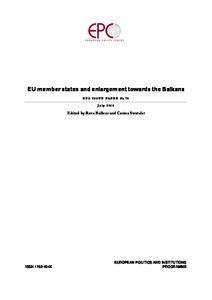EU member states and enlargement towards the Balkans
"The European Union’s enlargement to the Balkans seems to be running on autopilot since Croatia’s accession in 2013 and amidst the on-going crisis. While the region still has a clear European perspective, progress on the dossier has been marred not just by outstanding challenges in individual B...
| Main Authors: | , |
|---|---|
| Institution: | ETUI-European Trade Union Institute |
| Format: | TEXT |
| Language: | English |
| Published: |
Brussels
2015
EPC |
| Subjects: | |
| Online Access: | https://www.labourline.org/KENTIKA-19100818124919280909-eu-member-states-and-enlargeme.htm |
| Summary: | "The European Union’s enlargement to the Balkans seems to be running on autopilot since Croatia’s accession in 2013 and amidst the on-going crisis. While the region still has a clear European perspective, progress on the dossier has been marred not just by outstanding challenges in individual Balkan countries but often also by hurdles which develop within the Union – more specifically in the member states. While the EU’s internal procedures for handling enlargement have always been intergovernmental in nature, the frequency of incursions and opportunities for the member states to interfere and derail the process has increased over the past years, suggesting a so-called ‘nationalisation’ of enlargement. The present dynamics between the EU and the Balkans serve as a prime example of politics getting in the way of progress: on both sides, those in power and responsible for delivering success still need to show real engagement with the process. In 17 case studies and two theoretical chapters, this Issue Paper investigates whether the dossier has shifted more under the control of the member states, and looks at the kind of considerations and potential ‘roadblocks’ that influence the positions of key national actors on enlargement." |
|---|---|
| Physical Description: | 250 p. Digital |

